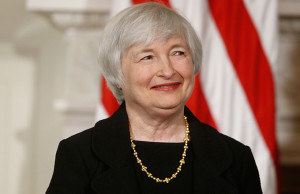 On Friday, I’m going to meet with the most powerful person in the economy.
On Friday, I’m going to meet with the most powerful person in the economy.
I’m not going to speak with any of the newly elected Congressmen or Senators, or even President Obama. Instead, a coalition of unemployed workers, underemployed workers and community leaders — including me — will share our stories with Janet Yellen, the Chair of the Federal Reserve.
The Federal Reserve is the most important economic policy maker in the country right now because election didn’t change the fact that Congress hasn’t – and likely won’t – pass legislation to meaningfully stimulate the economy and get us out of this recession. That means that the Fed is making the biggest decisions on the economy – and they’re doing it without any input from the public.
That’s why I’m going to Washington D.C. to meet with Janet Yellen: because the Fed needs to listen to people like you and me.
Here’s the story of one Wichitan, a regular churchgoer. He’s intelligent, soft-spoken, and earnest, but he can’t find a job because he has a criminal record. After he couldn’t find work for months, despite doing everything he could, his parole officer forced him to stay in a halfway house, separating him from his two young girls, all because he couldn’t find a job in this economy. There are so many people in my church who just need an opportunity, but they can’t find one. Accepting the economy as it is would have profound intergenerational effects.
Despite what we know about the economy – how our families live and struggle everyday – some members of the Federal Reserve claim the economy has recovered. These powerful members of the Federal Reserve say that we should accept the current levels of unemployment and underemployment as the new normal. They want to raise interest rates and stop stimulating the economy before the rest of us even have a chance to get back on our feet. That’s a terrible idea.
How can some members of the Fed be so out of touch? Because the Federal Reserve system is dominated by big banks and corporations. The regional presidents of the Fed are appointed by companies like Comcast, Darden Restaurants, and Chevron. Carmen Segarra, a regulator for the New York Fed, secretly recorded conversations between the Fed and Goldman Sachs exposing that the Fed was more interested in maintaining its cozy relationship with big banks than in serving the public interest. The members of the Fed who want to raise interest rates think that’s a good idea because they look at the economy through the skewed perspective of the corporations who selected them and the banks they’re captured by.
Unlike these members of the Fed who want to raise interest rates and stop the economy, Federal Reserve Chair Yellen understands the economy and cares about inequality. She recognizes that, although the official unemployment rate has fallen, the reality is we are suffering from too much underemployment, workforce participation rates that are too low, and wages that haven’t risen in years. But Yellen still has to make decisions with those other members of the Federal Reserve’s Federal Open Market Committee who don’t understand our reality, who live in a bubble of corporate and banking interests, and who think the economy has recovered and want to raise interest rates.
That’s why I’m going to Washington D.C. to meet with Janet Yellen. The debate on monetary policy needs to include those of us most affected by it. The unemployed, underemployed, overworked, and underpaid make up most of the people in the economy, and we have a right to have a say in how it runs.
The decisions of the Fed – the biggest decisions in the economy right now – are too important to leave to bankers and Wall Street. Our voices need to be heard too.
Rev. David Carter